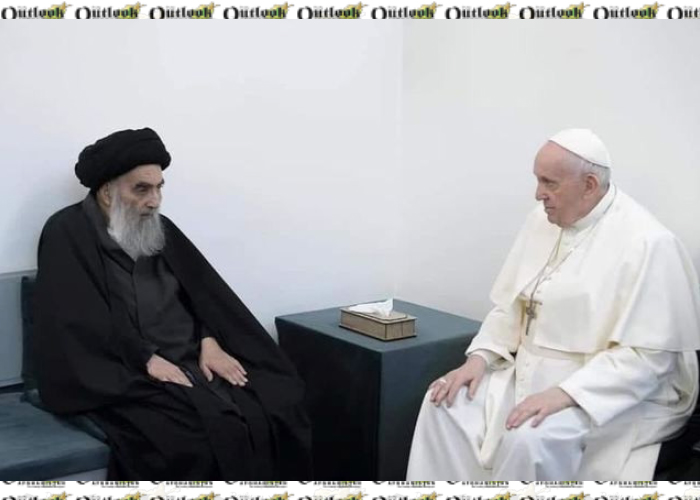UR- Pope Francis entered a narrow alleyway in Iraq’s holy city of Najaf to hold a historic meeting with the county’s top Shi’ite cleric and visited the birthplace of the Prophet Abraham on Saturday to condemn violence in the name of God as “the greatest blasphemy”.
The back-to-back inter-religious events some 200 km (125 miles) apart, one in a dusty, built-up city and the other in a desert plain, reinforced the main theme of his risky trip to Iraq - that the country has suffered far too much.
“From this place, where faith was born, from the land of our father Abraham, let us affirm that God is merciful and that the greatest blasphemy is to profane his name by hating our brothers and sisters,” Francis said in Ur, where Abraham was born.
With the desert wind blowing his white cassock, Francis, sitting with Muslim, Christian and Yazidi leaders, spoke within sight of the archaeological dig of the 4,000 year-old city that comprises a pyramid-style Ziggurat, a residential complex, temples and palaces.
Hours earlier in Najaf, Francis met Grand Ayatollah Ali al-Sistani, a visit that was a powerful signal for coexistence in a country torn by violence.
The U.S. invasion of 2003 plunged Iraq into years of sectarian conflict. Security has improved since the defeat of Islamic State in 2017, but Iraq continues to be a theatre for global and regional score-settling, especially a bitter U.S.-Iran rivalry that has played out on Iraqi soil.
Sistani, 90, is one of the most influential figures in Shi’ite Islam, both within Iraq and beyond, and their meeting was the first between a pope and such a senior Shi’ite cleric.
After the meeting, Sistani called on world religious leaders to hold great powers to account and for wisdom and sense to prevail over war. He added Christians should live like all Iraqis in peace and coexistence.
In a statement, Sistani said, “Religious and spiritual leadership must play a big role to put a stop to tragedy ... and urge sides, especially great powers, to make wisdom and sense prevail and erase the language of war”.
Their meeting took place at the humble home Sistani has rented for decades, located near the golden-domed Imam Ali shrine in Najaf. An official Vatican photo showed Sistani in his traditional black Shi’ite robe and turban sitting across from Francis.
Although Abraham is considered the father of Christians, Muslims and Jews, no Jewish representative was present at the inter-religious event in Ur.
In 1947, a year before Israel’s birth, Iraq’s Jewish community numbered around 150,000. Now their numbers are in single figures.
A local Church official said Jews were contacted and invited but the situation for them was “complicated” particularly as they have no structured community. However, in similar past events in predominantly Muslim countries, a senior foreign Jewish figure has attended.
“Hostility, extremism and violence are not born of a religious heart: they are betrayals of religion,” the pope said at Ur. “We believers cannot be silent when terrorism abuses religion; indeed, we are called unambiguously to dispel all misunderstandings,” he said. (Reuters)
Home » World » Pope Francis meets Iraq’s top Shi’ite cleric, visits birthplace of Prophet Abraham
Pope Francis meets Iraq’s top Shi’ite cleric, visits birthplace of Prophet Abraham

